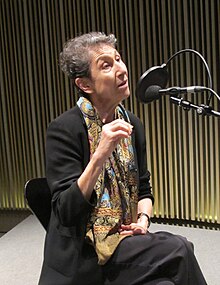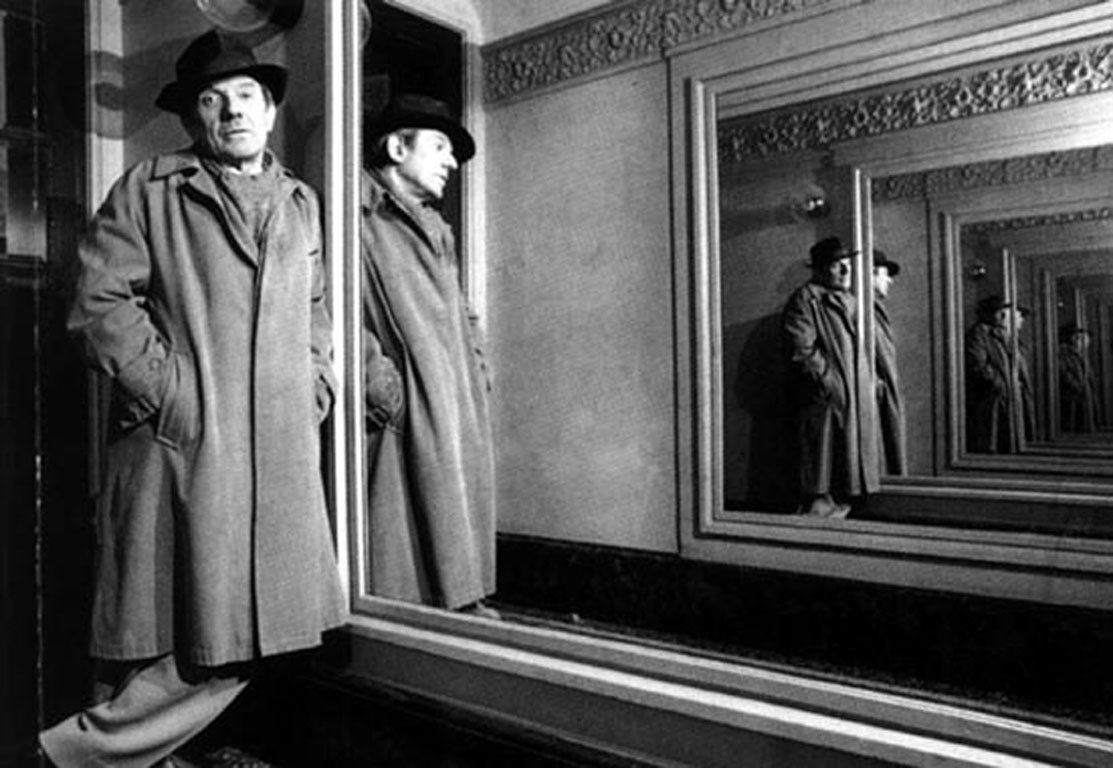Silvia Federici: "Witch-hunting past and present in the global political economy”
Announcement 11:38 AM
Silvia Federici
Professor
Emerita and Teaching Fellow at Hofstra University
Teacher, Activist, and Autonomist Feminist Philosopher
Teacher, Activist, and Autonomist Feminist Philosopher
"Witch-hunting past and present in the global
political economy”
Tuesday, October 23rd
Alumni Reading Room, Pratt Library
5pm
5pm
presented by
The Department of
Social Science and Cultural Studies
Speakers Series
Silvia Federici is a long time feminist activist, teacher and writer.

In 1972s she was a co-founder of the International Feminist Collective, the organization that launched the international campaign for wages for housework in the United States and Internationally. In 1990 she was a co-founder of the Committee for Academic Freedom in Africa and from 1991 to 2003 she was one of the editors of the CAFA newsletter. In 1995 she helped found the Radical Philosophy Association Anti-Death Penalty Project.
She has taught at the University of Port Harcourt (Nigeria) and she is now Emerita Professor at Hofstra University (Hempstead, New York).
Federici has authored many essays on feminist theory, women’s history, political philosophy and education. Her published books include: Revolution at Point Zero. Housework, Reproduction and Feminist Struggle; Caliban and the Witch. Women, the Body and Primitive Accumulation; Enduring Western Civilization: The Construction of the Concept of Western Civilization and its Others (editor); Thousand Flowers: Social Struggles Against Structural Adjustment in African Universities (co-editor).
Upcoming Fall 2012 Speakers
Franco Berardi
Uprising, Poetry, and Finance
Wednesday, November 14th
at 6pm
Alumni Reading Room, Pratt Library
Jeff Surovell
USSR and post-Soviet Russia, including domestic politics and foreign
policy.
Tuesday, November 27th
at 5pm
Alumni Reading Room, Pratt Library
Spring
2013 Speakers
Eva Illouz on the relationship between capitalism and emotional life.
(January, TBA)
Nona Shepphard
TBA
Co-sponsored with the Department of Humanities and Media Studies
Graduate Program in Media Studies
The Media Studies M.A. Program at Pratt is an intensive state-of-the-art program shaped in relation to Pratt’s art/design/architecture environment and to the burgeoning mediascape, lively social space, and theoretical scene of Brooklyn and New York City. Classes are small, following seminar, workshop and experimental formats, and all classes are taught by professors.
It is a given that media emergence is rapidly transforming experience, society and knowledge and that the saturation of the world by computers and screens has changed practically everything. This program is designed to foster, at an advanced level, the investigation of many of the significant social, political, cultural, economic and aesthetic questions of our time by drawing both on the historical record of media forms as well as on cutting-edge theory regarding issues of nation, political economy, gender, sexuality, race, aesthetic form, screen studies, etc. Our program prepares students for careers in media, media arts, or for Ph.D. programs in media by deepening and broadening each student’s understanding of the many interrelated functions of media in contemporary society. It also encourages students to pursue independent trajectories and create projects that may lead to places as yet uncategorized or defined.
The curriculum emphasizes studies of media, in their various forms, including film, video, television, photography, radio, writing and the computer-mediated convergence of these platforms. Guided by our diverse faculty, students study the logics and logistics of media and mediation, while they explore cultural technologies of expression, representation and manipulation along with the aesthetic, economic and political contexts in which such media operate. They also work on textual analysis, interpretation and semiotics. Students gain expertise in media history, media theory and media practice and are provided with opportunities for internships. For more information click http://prattmediastudies.com
Mediologies Conference
Each year in late April, the Media Studies Program hosts a conference, Mediologies, which includes presentations of work and works-in-progress by students, faculty, and guest presenters. These presentations may include critical papers, films, exhibitions, games and the like – all of which provide opportunities for discussion and debate of key issues. Seminar courses being offered in the spring enable students to develop papers and projects specifically for presentation at Mediologies.
Apply
If all this sounds appealing to you, we would welcome your application at Pratt. We are seeking highly intelligent, motivated students who wish to join a cohort of students and faculty working in an extraordinary program utilizing the newest and most socially relevant methods of media study and media theory. Applications for admission to the Master of Arts are due January 5 for the following fall; the program accepts fall entrants only. Applicants should have a B.A., B.S. or B.F.A. from an accredited institution. Candidates submit (1) a statement of purpose in which they describe their interest in the program; (2) 10-20 pages of relevant writing sample(s), with emphasis on analytical writing about media; (3) transcripts of undergraduate coursework; and (4) two letters of recommendation. All applicants follow the standard admission process for graduate programs at Pratt: see www.pratt.edu/apply.
Katie Kelley: New Coordinator of Student Activities for Critical and Visual Studies
Announcement 6:51 PM
We are very pleased to start the year off with announcing that Katie Kelley has become Coordinator of Student Activities! Gregg Horowitz, the Chair of Social Science & Cultural Studies emailed this announcement.
Hello All.I am pleased to announce that Katie Kelley, visiting instructor in SSCS, has agreed to serve as Coordinator of Student Activities for Critical and Visual Studies. Many of you have met Katie, but for those who haven't, here is a brief bio: Katie Kelley got her undergraduate degree at St. John's College, in philosophy and the history of math and science. She has an MA in philosophy from the New School for Social Research, where she is currently pursuing a PhD. Her dissertation focuses on Stanley Cavell's extended idea of medium specificity as a way of thinking the logic of artworks, as well as a way of rethinking and reconciling modernism and realism. She has written and published on Barthes, W.G. Sebald, Bazin's realism, photography and automatism.The Coordinator is a new position in SSCS. In it, Katie will work alongside Ric Brown to enrich the experience of our BA students in the major, the Department, and Pratt more widely. Here is the description of the position:*Duties of Coordinator of Student Activities for Critical and Visual Studies .*Participate in the new student orientation process. .*Integrate new students into the life of the program. .*Arrange for regular social gatherings for students and students/faculty*Facilitate guest speakers and faculty presentations*Help facilitate reading groups/gatherings for students and/or students and faculty. .*Arrange for an end-of-semester party, thesis presentation, and graduation gathering.Please join me in wishing Katie good luck with her new responsibilities.
"Corinne Rendinaro moved to New York after high school to study Fashion Design. After taking a required course in life drawing, she found her true passion was art. She changed her major to Fashion Illustration where her attention was focused on movement of the body and gesture. Corinne then attended Pratt Institute to study Critical and Visual Studies. She has also studied in Florence, Italy and Copenhagen, Denmark."
Her work is being exhibited with those of Ross Schaner and
William DeNatale in their first New York show.
368 Broadway, No. 209, 917.495.2457
Tribeca / Downtown
July 24 - August 4, 2012
Opening: Tuesday, July 24, 6 - 9 PM
 |
| Left side of the “Spectrum of Life” exhibit in the Hall of Biodiversity at the American Museum of Natural History Source: Image taken by Molly H. Adams September 2011 |
At the end of the semester, the faculty of the Department of Social Science and Cultural Studies recognized two of our seniors for their outstanding thesis work. This year, we were pleased to give the Senior Thesis Award to Molly H. Adams for her thesis Communicating Interdependence: Ecological Thinking and the Natural
History Museum.
 |
| View of the Old Field, pond and trails from the deck on the East side of the South Fork Natural History Museum Source: Image taken by the Molly H. Adams, March 2012. |
Comparing the American Museum of Natural History, particularly its Hall of Biodiversity, with the smaller and more recent South Fork Natural History Museum and Nature Center on eastern Long Island, Adams examines the techniques used to by each museum to communicate its understanding of ecology and Nature. She moves from there to a discussion of the politics and aesthetics of Mark Dion’s Neukom Vivarium (2006).
Mark Dion’s Neukom Vivarium (2006) at the Olympic Sculpture Park in Seattle, Washington
Source: Image taken by Janine Robinson <http://lagunadirt.blogspot.com/2011_04_24_archive.html>
In addition to the award for her thesis, Adams also won Academic Achievement Honors at Convocation for her outstanding academic work throughout her undergraduate studies (See: http://www.christopherxjjensen.com/2012/05/11/molly-h-adams-earns-top-honors-from-the-critical-and-visual-studies-program/).
Here is a brief excerpt from Communicating Interdependence: Ecological Thinking and the Natural
History Museum:
"The Hall of Biodiversity’s installation labeled the “Spectrum of Life” uses
more than 1,500 specimens and models, organized into 28 living groups to show over 3.5 billion years of evolution and to display the awe-inspiring diversity of life. The Linnaean taxonomical approach of categorization, which is used in this display, groups all life into three kingdoms that are divided into classes, and then into orders, families, genera and species. It helps viewers to see an extremely wide variety of different types of organisms by separating microorganisms from mammals and bacteria from birds. This technique of organization emphasizes the quantitative aspects of biodiversity rather than qualitative ones. Because of this, the visual display of replicas and specimen fails to communicate the importance of each organism in the ecosystem of which they are a part. In other words, somewhat ironically, the roles of ecosystems themselves are neglected, and rather the emphasis is placed on the range of different species and the diversity of their visual characteristics. For example, several organisms are shown either in a linear fashion according to size, ranging from smallest to largest, or collected in naturalist boxes, neglecting to visually represent any ecological relationships that add biological meaning and context. These organisms have been dissected from the communities and ecosystems in which they actually reside in nature, making it impossible to realize the greater context that they are pulled out of."
______________
Elizabeth G. Merrill was recognized for her thesis But Hallucinations Are Also Facts: Althusser, Philosophical
Autobiography, and the Narration of Mental Illness. Her thesis traces the interconnections and contradiction, the breaks and continuities, between and behind Althusser's long battle with depression, his famous mental break-down (during which he strangled his wife in his sleep) and his philosophical readings of Marx and Lacan, among others. Merrill uses Althusser's own autobiography, written as a kind of Confession upon his release from psychiatric care to discuss the relation of self and narratives of self to confessional autobiography and of philosophical work to mental illness.
"My goal is not to judge the merit of the philosophical concepts credited to Althusser, or to place those concepts in relation to those developed by other philosophers. Rather, I will discuss these concepts, and their revision in light of personal revelations, as they present themselves in Althusser’s memoir. The ways in which Althusser’s reflection on his experiences leads him to revise his theories of repressive and ideological state apparatuses shed light on the relationship between philosopher and philosophy, particularly when something as powerfully disruptive as mental illness is at work. Any claims made about Althusser’s mental illness will be derived solely from his own commentary on it, though I also hope to investigate the place of the creative and mentally ill in society generally. In presenting the life and work of Althusser as representative of the complicated relationship between the often private, lifelong project of Merrill handling mental illness and the individual’s public creative output, I hope to understand how these two factors can exist together and inform one another."
_______________
Note: It was an exceptionally difficult decision this year, as the faculty was very impressed by the work and dedication of our students. The suggestion was made to give everyone an award for if nothing else getting through the thesis process. Given this year, that sounds like a very good idea! Congratulations to Molly, Lilly, and to all of our thesis students!
Curated by a group of interdisciplinary students from Pratt Institute, the 4th Annual Wallabout Film Festival is proud to present the work of innovative student filmmakers from around the world in two programs. From stories of love gone bad and revenge not going according to plan, to explorations of greed and the pleasures of big butts, this year’s films will entertain, provoke, and inspire.
The Wallabout Film Festival is a student film festival produced and programmed by an interdisciplinary team of students from Pratt Institute. Showcasing films by innovative student filmmakers from around the world, Wallabout is a platform for students to screen their work to a diverse community of peers, artists and industry professionals, initiating conversation and collaboration. Wallabout is an important forum for supporting student filmmaking and for adding to the vibrant creative culture of Brooklyn.
When and where does the festival take place?
The 2012 Wallabout Film Festival will take place on Thursday April 26th at IndieScreen in Williamsburg, Brooklyn.
The Department of Social Science and Cultural Studies invites you to attend a lecture by the SLAS Distinguished Scholar Juan Cole, Richard P. Mitchell Collegiate Professor of History at the University of Michigan, on the question "Whatever Happened to the Arab Spring?" Professor Cole's lecture will be held on Monday, April 23, at 6 PM in the Alumni Reading Room.
Professor Cole's most recent books are ENGAGING THE MUSLIM WORLD (Palgrave Macmillan, March, 2009) and NAPOPLEON'S EGYPT: INVADING THE MIDDLE EAST (Palgrave Macmillan, 2007). Many of us also know him as the invaluable blogger of INFORMED COMMENT, columnist on the website TRUTHDIG, and frequent guest on PBS News Hour with Jim Lehrer. He has also appeared on ABC Nightly News, Nightline, the Today Show, Charlie Rose, Anderson Cooper 360, Countdown with Keith Olbermann, Rachel Maddow, the Colbert Report, Democracy Now! and many others.
Please join us for what promises to be an informative and provocative evening.
Best,
Gregg M. Horowitz, Chair
Department of Social Science and Cultural Studies
Pratt Institute
200 Willoughby Avenue
Brooklyn, NY 11205
718-399-4427Film by Joshua Sobel (B.A. Critical and Visual Studies '10) to Premiere at Tribeca Film Festival this April
Joshua Sobel is a Brooklyn-based video director and independent film producer from Miami Beach. While at Pratt Institute, he was one of the founders of the Wallabout Film Festival, an international student film competition currently in its fourth year. Graceland is his first credit as co-executive producer.
"Films by Pratt Institute Alumni to Premiere at Tribeca Film Festival this April"
Senior
Thesis Public Reading
and
Reception
***
Dekalb
Gallery
Tuesday,
April 17, 2012
5pm
- 6:30
Molly H. Adams.
Communicating Interdependence: Ecological Thinking and the Natural
History Museum.
Alexander Damianos.
A Study of the Public School New York.
Michael Enten.
The District Divide: An Investigation of the Effects of
Gentrification on Go-Go Music in Washington, D. C.

Rebecca Huber.
The
Rise of the New Woman: Autonomy and Identity in Fashion and the
works of Gabrielle "Coco" Chanel.
Elizabeth G. Merrill.
But Hallucinations Are Also Facts: Althusser, Philosophical
Autobiography, and the Narration of Mental Illness.
Shaina Travis.
Transitions as a Rider: How Skateboarding
Benefits from Corporate Business.
Dekalb
Gallery
Tuesday,
April 17, 2012
5pm
- 6:30
Department
of Social Science & Cultural Studies
School of
Liberal Arts and Sciences
Information:
Joshua Karant, jkarant@pratt.edu
The current semester's these are now being defended! Congratulations to our seniors!
Molly H. Adams.
Communicating interdependence: Ecological Thinking and the Natural History Museum.
Alexander Damianos.
A Study of the Public School New York.
Michael Enten.
The District Divide: An Investigation of the Effects of Gentrification on Go-Go Music in Washington, D.C.
Rebecca Huber.
The Rise of the New Woman: Autonomy and Identity in Fashion and the works of Gabrielle "Coco" Chanel. Elizabeth G. Merrill
But Hallucinations Are Also Facts: Althusser, Philosophical Autobiography, and the Narration of Mental illness.
Shaina Travis.
Transitions as a Rider: How Skateboarding Benefits from Corporate Business.
We will have a public reading in about a week which will be announced in a separate posting.
“The Face of the Outside:
Gilles Deleuze
and the Philosophy of the Other”
A presentation by Gregory
Flaxman
Thursday, April 12, 5:30
Alumni Reading Room
Pratt Library, 3rd
Floor
Gregory Flaxman is Associate Professor of
English and
Comparative Literature, and Adjunct Professor of Communications,
at the
University of North Carolina, Chapel Hill.
His book, Gilles
Deleuze and the Fabulation of Philosophy, Volume 1
(University of Minnesota
Press, 2012), explores the centrality of aesthetics to project of
philosophy as
an ongoing creation of new concepts.
He
is also the editor of a collection of essays on Deleuze’s film
theory, Cinema 1 and 2, The
Movement Image and The
Time Image, entitled, The
Brain is the Screen: Deleuze and the
Philosophy of Cinema (University of Minnesota, 2000).
This event is co-sponsored by Humanities and
Media Studies,
the School of Liberal Arts and Sciences, and the United Federation
of College
Teachers 1460. Please contact Suzanne Verderber
(sverderb@pratt.edu), Associate
Professor of Humanities and Media Studies, for further
information, or for an
excerpt from the Fabulation
of Philosophy.




















